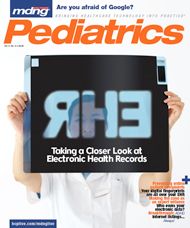Publication
Article
MDNG Pediatrics
Tech Talk: The Contract You Never Read
One of the most important legal documents in your practice may have a significant impact on your finances. And even though you (or someone in your practice) agreed to abide by its terms and conditions, it's highly likely that you have never even read it.
I'm talking about the End User License Agreement (EULA) that comes with each software program on your computer. I must confess that in the past I almost never read EULAs either, especially when installing a new version of consumer software from well-known vendors like Adobe, Apple, and Microsoft. The EULA is a legally binding contract that spells out the terms under which an end user may utilize a software program. Most EULAs are presented electronically, during software installation, and off er you two choices: accept or refuse. Of course, not accepting the EULA means you can’t install the software.
The terms outlined in the EULAs are very important when it comes to critical business software. Few programs are as critical to a physician practice as the Electronic Health Record (EHR). Because EHRs contain the medical records of patients, they are subject to a wide range of laws, including federal HIPAA and privacy regulations and state mandates regarding how long medical records must be kept on file after a physician retires or a patient dies. The EHR EULA often addresses many of these requirements.
But beyond this, the EULA has become the software vendor’s legal armor, requiring users to waive more rights than you can imagine. The EULA is essentially non-negotiable—either you accept it or you cannot install and use the software. Unfortunately for end users, EULAs are designed to provide maximum protection for vendors while minimizing the legal options and remedies for users who are dissatisfi ed with the product. Nearly every EULA I have ever seen includes the following paragraph:
THIS PRODUCT IS PROVIDED TO YOU “AS IS” WITHOUT WARRANTY OF ANY KIND, WHETHER EXPRESS, IMPLIED, STATUTORY, OR OTHERWISE. THIS COMPANY AND ITS LICENSORS BEAR NO LIABILITY FOR ANY DAMAGES RESULTING FROM USE (OR ATTEMPTED USE) OF THE PRODUCT.
When you click on the button to accept the EULA on your way to installing software, you are agreeing to assume all risks, no matter what the software does, doesn’t do, or does wrong.
The EHR system I developed (Amazing Charts) also had a strongly worded, attorney-written EULA. Although 99.9% of our users simply accepted this, a vocal 0.1% decided to speak up, and made their dissatisfaction known on our company-sponsored online bulletin board. The subject also came up at our recent users’ group conference, which gave me the opportunity to understand fi rsthand how strongly people felt about this issue. It turns out they had a point, and what they wanted seemed completely reasonable.
Our clients wanted to ensure that the clinical data being generated and saved to the program’s database belonged to them. They were concerned that if my company went out of business, or if they wanted to move to another program (which doesn’t happen often), they would be guaranteed access to their data, and be able to get it without paying for it. Believe it or not, most EHRs don’t release your clinical data without requiring thousands of dollars in “ransom.” Although Amazing Charts has always allowed customers to export their clinical data, these users wanted this spelled out in the EULA. Our customers also wanted the EULA to guarantee our EHR wouldn’t use spyware or provide their prescription and other clinical habits to any third parties, such as insurers, pharma, or the government.
Based on this feedback, we’ve rewritten our own EULA to refl ect our clients’ concerns and clearly state the key concepts usually obscured by legalese (you can read our latest attempt on our user board). Because most of us don’t make a decision to use one program over another based on the fairness of the EULA, this hasn’t yet become one of the methods potential customers use to evaluate EHR systems. However, I suggest you take the time to actually read the EULA before you click “I Accept.” You might be surprised by what you find there.
Dr. Bertman is Physician Editor-in-Chief of MDNG: Primary Care/ Cardiology Edition. He is a Clinical Assistant Professor of Family Medicine at Brown University and president of Amazing Charts.com, a leading developer of EHR software. He is also the founder and president of AfraidToAsk.com, a consumer website focusing on personal medical topics. He is in private practice in Hope Valley, RI.
